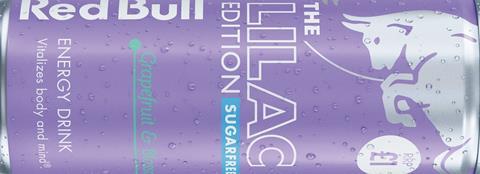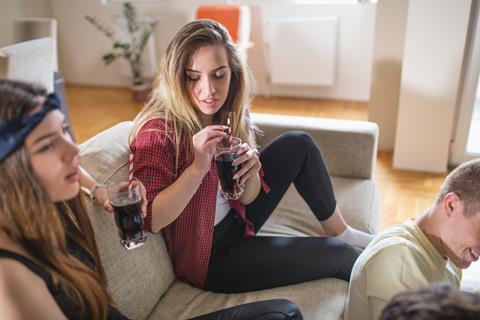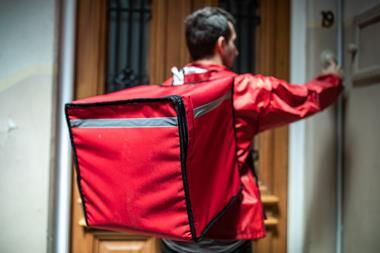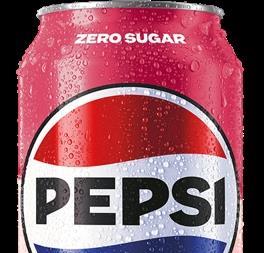
There is no doubting the soft drinks category’s place within the forecourt shop products’ hierarchy. According to Nielsen data for multiple forecourts, it comes second only to tobacco and vaping and as such is worth nearly £500m. And that’s just the multiples’ sites. It’s difficult to calculate its importance to independents’ sites but anecdotally it’s hugely so, just from talking to retailers and looking at the space they give to the category in-store.
Forecourt stores sit within the convenience and impulse sector, a sector which Carlsberg Britvic’s Soft Drinks Review 2025 says accounts for £3.2bn-worth of soft drinks sales. The total market for soft drinks in the UK amounts to a whopping £21bn, with grocery taking the lion’s share (£10.2bn), followed by the licensed sector (£4.7bn), convenience/impulse (£3.2bn) then foodservice (£3bn).
That £3.2bn is a massive sum but, according to Carlsberg Britvic, forecourt retailers could be selling even more soft drinks.
The company has put together ‘seven steps to success’, which it calculates could drive soft drinks sales growth in the convenience channel by £225m, which equates to roughly £5k per store. Below, we find out what you can do to try and gain some of those extra sales.

Step 1: Fuel further
Retailers should ensure their ranging is on point in terms of variety when it comes to energy drinks. Glucose, sport and stimulant drinks are the biggest soft drinks sectors for the UK’s convenience retailers, says Carlsberg Britvic, accounting for £1.67bn in sales in 2024 (Nielsen). And their consumers are extremely valuable too. Not only do these consumers shop more frequently and buy more items in store than average soft drinks shoppers, but they also spend significantly more (£11.86 per trip versus £8.99 Lumina). Of course these figures are for the overall convenience sector but imagine what they are for forecourts where energy drinks really are king.
Key to the energy drinks sector is Red Bull, which has had great success in bringing new flavours to market. Its latest is Red Bull Sugarfree Lilac Edition, which has the taste of grapefruit and blossom.
According to Nielsen, the new product scored positively in flavour testing, with 75% of energy drink buyers saying they would be likely to purchase a grapefruit and blossom flavoured energy drink. Initially launching into wholesale this week, Red Bull Sugarfree Lilac Edition will be rolling out to the wider convenience and grocery channels from July.
A spokesperson for Red Bull says: “The appetite for flavoured functional energy is huge and continues to grow. It’s a market that now caters to 12 million shoppers (Kantar). Red Bull Editions are tapping into this demand and recruiting new buyers to the wider energy drinks category, with 18% of Red Bull Edition NPD shoppers new to functional energy last year (Kantar).”
The new product follows the success of the brand’s first entirely sugar-free edition launched last year. Pricemarked 250ml cans are available at £1.60 while rrp is £1.65. However, to drive trial, for a limited time from launch, Red Bull is also making a £1 pricemarked can available on a ‘when it’s gone, it’s gone’ basis.

Step 2: Make meals matter
Last year, soft drinks featured in just 28.6% of meals eaten in the UK and, for those aged under 25, 27.7% of meals didn’t include any kind of drink whatsoever (Kantar/Lumina data). When it comes to the ‘meal for tonight’ occasion, only 16% of these occasions feature soft drinks. Retailers can fix this by stocking soft drinks in larger format packs in chillers alongside meal for tonight solutions – and by offering set price meal deals that include soft drinks.
The Co-op has an ongoing members’ deal offering two pizzas, one side and either a four pack of Pepsi Max or a four-pack of Peroni for a price. Carlsberg Britvic says that with fewer people drinking alcohol, linking food with soft drinks is becoming an increasingly important promotional tactic for maintaining shopper spending levels.

Step 3: Take over treat times
Some 26.4% of treat missions result in the sale of soft drinks (Lumina). This makes soft drinks the second most bought treat items after confectionery. While it’s vital to stock up on the classics, retailers are advised to introduce new limited-edition flavours to pique shoppers’ interest.
A good example of a new limited edition is 7UP’s Pink Lemonade, a zero-sugar variant in a lemon, lime and raspberry flavour.
7UP is the number one lemon and lime brand in GB (Nielsen) and this is its first launch since 2020. Britvic Carlsberg says 7UP Pink Lemonade looks to capitalise on the growing role of innovation in driving growth in the flavoured carbonates category which, over the last three years has accounted for 35% of total flavoured carbonates value growth (Nielsen).
Research from 7UP has shown that the colour pink cues flavour, hydration and refreshment, making the eye-catching pink liquid and packaging a key factor in driving shopper engagement.

Step 4: Opportunities for impulsive socialising
In-home socialising occasions hit 17bn last year as 37% of people reported going out to eat and drink less in response to economic pressures (Mintel). This presents opportunities for retailers who offer the right drinks at the right price for people who are socialising at home.
Carlsberg Britvic, in its report, points to the fact that more people are turning their backs on alcohol and looking for soft drinks when socialising. This is where products like J2O come in. J2O has been a popular choice among consumers seeking soft drink alternatives since its launch back in 1998 and with 48% of people now looking to moderate their alcohol intake, compared to 36% in 2018, sales are set to grow further (Kantar).

Step 5: Add value to hydration
Nearly a third (31%) of all Gen Z drinks occasions feature tap water, bottled water or flavoured hydration drinks like iced tea, compared to a UK average of 24% (Kantar). Retailers can encourage younger consumers looking for hydration to trade up with drinks like Aqua Libra’s range of pure filtered still, sparkling and flavoured waters.
For even younger consumers, earlier this year, Innocent drinks launched a new range of kids juicy water, available in apples & strawberries and apples & mangoes variants.
Both drinks are school lunchbox compliant, contain no added sugar, sweeteners or artificial flavours, and are made with 70% real fruit, a splash of water, and natural flavours, and count as one of the recommended ‘5-a-day’.
The product’s launch into convenience stores followed an exclusive initial launch in 549 Burger King restaurants across the UK, as a worldwide first-to-market.

Mockingbird Raw Press lands in 400 MFG sites
Award-winning smoothie brand Mockingbird Raw Press has launched two of its best-selling cold pressed smoothie SKUs into 400 MFG petrol forecourt sites across the UK.
The rollout, which began earlier this month, marks the company’s largest forecourt partnership to date, significantly expanding access to nutritious, cold pressed smoothies.
The two products are: Raw Greens, which is described as ‘the ultimate green smoothie’ and contains kiwi, pear, kale, spinach, broccoli, apple and lots of Vitamin C; and Raw Defence, which is described as ‘invigorating and uplifting’ and contains mango, passion fruit, acerola cherry, carrot, orange, celery & Vitamins B12 and C.
Mockingbird Raw Press says this nationwide expansion is a major step in its mission to make healthy, high-quality drinks more accessible to people on the go.
“We’re incredibly excited to partner with MFG on this launch,” says Max Coleman, head of out-of-home sales at Mockingbird Raw Press. “This is a huge milestone for us and a big win for health-conscious consumers. Forecourts are long overdue for better options, and we’re proud to lead that shift with our Raw Greens and Raw Defence smoothies.”

Step 6: Push permissible choices
Low-calorie soft drinks have grown at 5.5% in value over the past year, outperforming full sugar products, which inched up by 3% (Britvic/Mintel data). That’s why it’s crucial that forecourt retailers are well-stocked with lower sugar and sugar-free offerings.
A lower-sugar drink that is new to market is Tropicana Sparkling. Available in two variants – Zesty Orange and Tropical Twist –each 250ml can contains 30% pure handpicked, natural origin fruit juice, infused with sparkling water to provide a light, refreshing drink. Both variants contain no added sweeteners and are less than 65kcals per serve.
And earlier this year, Tropicana launched Fresh & Light, a new range of fruit juice drinks with 30% less sugar naturally, compared to the market average blended juice or apple and grape juice. There are three variants: Morning Orange, Crisp Apple and Tropical.

Step 7: Recruit with healthy heroes
Mintel research shows that 69% of Brits say they’re trying to live healthier lifestyles, with products featuring added benefits playing a key role in this. Retailers can capitalise on this trend by pairing functional health drinks with healthy snacks and meals at different times of the day.
Carlsberg Britvic says kombucha is an opportunity that’s ‘ripe for the taking’. Sales have grown by 33% in the convenience sector over the past year (Nielsen) and they are poised for further growth following the recent launch of the Lipton Kombucha range, which brings a mainstream, recognised brand to the category.
The new Lipton Kombucha has kombucha blended with natural fruit flavours, Lipton tea and tiny bubbles to make a drink which is low in sugar, low in calories and made with naturally fermented tea. It comes in 250ml single cans and multipacks of four, in flavours including Strawberry Mint, Raspberry and Mango Passionfruit.
Ben Parker, VP sales off-trade, Carlsberg Britvic, says: “We know how popular the kombucha trend is and believe Lipton has created a product that can introduce even more people to the category and its benefits. As a brand, we are in a good position to grow an exciting category and we’re really looking forward to shoppers being able to try the flavours and for retailers to reap the current untapped rewards of stocking it.”





























